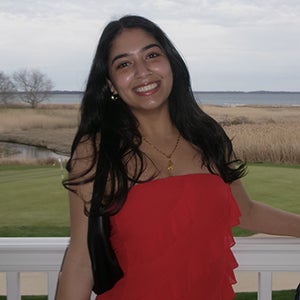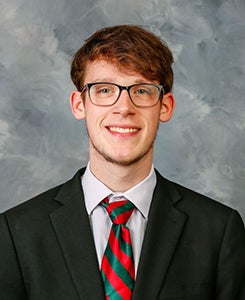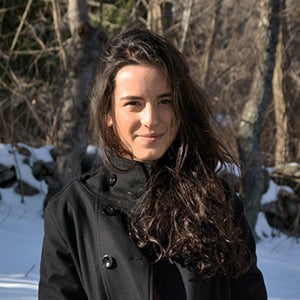Undergraduate Research Profiles
Snaha Pokharel
 Snaha’s project focused on making AI tools more accessible to students across various domains. The research tackled a common problem: many students don’t know about the wide range of AI capabilities available or find these tools too complex to use effectively.
Snaha’s project focused on making AI tools more accessible to students across various domains. The research tackled a common problem: many students don’t know about the wide range of AI capabilities available or find these tools too complex to use effectively.
The project involved creating detailed instructional guides for popular AI tools in image and music generation. For image generation, Snaha explored Canva Magic Media, DALL-E, DreamStudio, and Adobe Firefly, developing comprehensive tutorials that showcased each tool’s unique strengths for different needs like social media posts and logos. For music generation, Snaha worked with Udio, Suno, Deep AI, and ChatGPT Music Generator, focusing on composition and lyric creation guides.
Beyond step-by-step instructions, the work provided technical background explaining how these AI models actually work, giving students insight into the underlying architecture. The research also gathered user feedback through surveys, showing that ChatGPT was the most popular tool among students.
This projrct demonstrates how CS students can bridge the gap between complex AI technology and practical application, developing valuable skills in research, technical communication, and user experience design. The work was conducted under the supervision of Indrani Mandal.
Marcus Diaz
This research project explored how machine learning can be used to understand and address biases in socio-technical systems. The work focused on creating a Python API that uses Gaussian Mixture Models (GMMs) to replicate real-world societal disparities in data. By controlling variables like sampling noise and correlations, and feature distributions, the API supports bias detection and mitigation, integrating with tools such as IBM AIF360. The resulting datasets allow machine learning practitioners to identify and correct bias more systematically, allowing for fairer, more equitable algorithms.
Marcus gained technical skills through this project, including implementing GMMs, designing modular Python APIs, and conducting rigorous testing. Marcus also learned how machine learning algorithms can reflect societal biases if not carefully managed. The experience taught research best practices such as formulating problems, reviewing literature, and collaborating effectively within a team. This work was done under the supervision of Sarah Brown.
Jacob Hyun
![]() Jacob worked on Extract-ED, a Chrome extension designed to help computer science students learn more effectively by extracting code snippets from YouTube videos. Using the Gemini API, the extension reduces the time and effort spent transcribing code, giving learners ready-to-use examples that clarify concepts and speed up the learning process. The project also included a research component to assess the tool’s usability and impact on student understanding of coding concepts.
Jacob worked on Extract-ED, a Chrome extension designed to help computer science students learn more effectively by extracting code snippets from YouTube videos. Using the Gemini API, the extension reduces the time and effort spent transcribing code, giving learners ready-to-use examples that clarify concepts and speed up the learning process. The project also included a research component to assess the tool’s usability and impact on student understanding of coding concepts.
Through this project, Jacob gained experience in technical development and research methods, learning how to build browser extensions, integrate APIs, and troubleshoot challenges, such as ensuring the extension updates smoothly when switching videos. The research component provided experience with conducting interviews, collecting feedback, and analyzing user behavior to refine the tool’s design. Overall, the project provided hands-on experience in creating a practical educational resource while focusing on user-centered design and iterative improvement.
Owen Costa
Owen’s research focused on understanding and reducing subspace feature bias, a type of data imbalance that can skew machine learning model outcomes. By generating synthetic biased datasets and applying Gaussian Naive Bayes (NB) and GerryFair classifiers, the study explored how each approach affected fairness and accuracy metrics. Results showed that, in two-dimensional cases, the GerryFair classifier often outperformed Gaussian NB in both fairness and accuracy as the bias level increased. These findings provide insight into how different algorithms handle biased data, contributing to the ongoing effort to make machine learning models fairer.
The project provided learning experiences including improving Python programming skills, becoming proficient with GitHub for collaborative coding, and gaining experience with batch processing for large-scale data generation. These skills, combined with a deeper understanding of algorithmic fairness, will support future endeavors in building fair and reliable machine learning systems.
The project is viewable at Sarah Brown’s ML4STS Lab site at https://ml4sts.com/projects/.
Mark Lovishuk
Mark’s project involved developing a price quotation request form for a small exterior cleaning business, designed to simplify the pricing process. The form allowed clients to specify surfaces they wanted cleaned, the materials involved, and how long it had been since their last cleaning. Pricing was adjusted based on these inputs, helping ensure quick, accurate estimates. A key component of the project was building a database to store all quote records, which provided an easy way to verify that estimates were accurate and consistent. The main goal was to speed up the quoting process because responding quickly often leads to winning more jobs.
Mark gained experience with multiple web technologies, including Django, HTML, and SQL and learned how to build a functional form, manage user input, and set up a database. The experience also clarified his career interests, leading him to consider more analytical roles rather than pursuing web development in the future. Mark worked with Samantha Armenti.
Andrew Medeiros
Andrew’s project examined how workshop-based experiential learning helps college students engage with new AI tools. Conducted at the URI’s AI Lab, under the guidance of Prof. Indrani Mandal, the research involved interactive sessions and demonstrations of tools like DALL-E, NightCafe, GitHub Copilot, and Grammarly, with the goal of evaluating how students responded to these tools, identifying obstacles they faced, and measuring the overall success of the workshops.
The findings showed that students were generally interested in the material but encountered challenges such as complex setup processes and a lack of examples tailored to their specific fields. To improve the workshops, the team recommended simplifying tool installation, creating more user-friendly guides, and adjusting the content to better fit the students’ academic and career goals.
Andrew learned how user-centered design can improve educational programs, balancing technical content with accessible and relevant teaching methods. He also developed skills in gathering iterative feedback and using observational techniques to evaluate educational programs and in collaborating effectively with a research team.
Sean Phelan
This project involved creating a game in the Godot engine, requiring work in coding, art asset creation, and game design. Sean developed all aspects of the game from scratch, using various tools and programs to produce original sprites, audio, and gameplay mechanics. By undertaking the project solo, Sean gained insights into managing workflows, handling setbacks, and iterating on designs.
A key takeaway from the experience was learning to set realistic project goals. Initially, the project’s scope was too ambitious for the available time, but adjusting those expectations allowed for steady progress and completion, providing experience in how to approach future projects in a more practical, achievable way. In addition, the project deepened understanding of game engines, asset creation, and the overall process of bringing a game from concept to completion.
Max Mercurio
Max’s project focused on using data from Reddit to uncover patterns in how coding languages are used in Computer Science courses at different universities. He developed a Python program to scrape comments from university subreddits to extract information from the challenging environment of informal, syntactically inaccurate posts. The program analyzed these posts to identify the programming languages mentioned, creating a dataset that offers insights for both students and educators. Students can use the data to anticipate which programming languages they’ll encounter in upcoming courses, while educators can use it to spot language trends and refine course material.
Beyond the technical work, Max learned the importance of fitting information extraction methods to the unique communication styles of specific online communities. Max also discovered that research is not always about rigidly following a predefined plan; instead, it often involves trial, error, and spontaneous insights.
Brian Materne
After joining the Algorithms for Big Data research group in spring 2023, Brian attended weekly check-ins, met with a professor, and studied the group’s published research to understand their ongoing work. During the summer, he contributed a Kulsinski distance function and added testing metrics to the group’s GitHub repository, while following the team’s Git workflow conventions. Brian plans to continue collaborating with other members, staying involved until graduation.
In addition to the technical contributions, Brian gained experience in a research environment, strengthening his preparation for graduate school. Brian became proficient in a research-focused Git workflow and benefited from group discussions, receiving feedback and insights that also helped with personal projects. This ongoing involvement provided hands-on research experience, teamwork practice, and exposure to professional development tools.
Kulsinski distance / set distance tests pull request:
https://github.com/URI-ABD/clam/pull/213
ABD webpage listing: https://homepage.cs.uri.edu/~ndaniels/research/abd/team/
Aidan Leach
Aidan’s project together with Liam Washburn focused on improving a website originally built with VanillaJS for speed. The team aimed to retain high performance while making the site easier to maintain and expand; they updated the site to use a Glide Data Grid component within a React-based Astro site, selecting these technologies for their balance of performance, scalability, and maintainability.
Glide Data Grid was chosen for its ability to handle large datasets efficiently, offering features like multi-cell selection and cell editing while scaling to millions of rows. React’s component-based structure made adding and managing new features simpler. To address React’s slower performance in multi-page applications, Astro was used for its server-side rendering capabilities, reducing client-side JavaScript dependence and improving page load times by as much as 40 percent. The combination of tools allowed the team to maintain high site speeds, simplify future updates, and streamline long-term maintenance.
Aidan gained valuable experience with modern web development frameworks, collaboration, version control, and research methods. This work resulted in a more versatile, scalable site that continues to support data-driven research while remaining easy to adapt and maintain. Aidan worked with Prof. Shaun Wallace.
https://shaunwallace.org/hax/
https://drafty.cs.brown.edu/csprofessors
Liam Washburn
Liam’s project focused on redesigning an outdated website that hosted a spreadsheet of computer science professor data. Originally built with VanillaJS, the site achieved high speeds but was difficult to maintain and update with new features. To solve this, Liam and his research partner Aidan Leach transitioned the spreadsheet into a Glide Data Grid using the React framework within an Astro site. This change allowed for faster performance, scalable large dataset handling, and easier feature implementation.
Glide Data Grid was chosen for its efficient lazy rendering of millions of rows, built-in features like cell editing and multi-selection, and documentation that made customization straightforward. React’s component-based approach improved maintainability, and Astro’s server-side rendering reduced JavaScript client-side load by up to 90%, enhancing page speed and user experience. By adopting an Islands Architecture, the project optimized interactivity while maintaining fast load times and search engine optimization.
The students gained experience with modern tech stacks, learned about website back-end operations, improved their collaboration and version control skills, and gained a deeper understanding of web development, teamwork, and research methodology. Regular meetings with their supervisor provided guidance and allowed them to iteratively refine their approach. Liam worked with Prof. Shaun Wallace.
https://shaunwallace.org/hax/
https://drafty.cs.brown.edu/csprofessors
Andrew Bilodeau
 Andrew’s project explored the practical uses of artificial intelligence tools to improve productivity, spark creativity, and make complex tasks easier. It began with tools like SlidesAI, Copy.ai, and Otter.ai, which helped streamline everyday activities. SlidesAI, for instance, turned basic content into polished presentations, saving time even if adjustment was still needed. Andrew found that Copy.ai acted as a writing partner, quickly generating content for blogs, captions, and brainstorming, while Otter.ai converted speech into text, making it easier to keep track of ideas from lectures or meetings.
Andrew’s project explored the practical uses of artificial intelligence tools to improve productivity, spark creativity, and make complex tasks easier. It began with tools like SlidesAI, Copy.ai, and Otter.ai, which helped streamline everyday activities. SlidesAI, for instance, turned basic content into polished presentations, saving time even if adjustment was still needed. Andrew found that Copy.ai acted as a writing partner, quickly generating content for blogs, captions, and brainstorming, while Otter.ai converted speech into text, making it easier to keep track of ideas from lectures or meetings.
Next, the project shifted to creative AI tools. Platforms like DALL-E, NightCafe Creator, and Stable Diffusion allowed the creation of detailed, vibrant digital art just by providing text prompts. These tools made it easy to experiment with artistic ideas without needing specialized art skills.
Finally, Andrew looked at AI-driven programming and video creation. GitHub Copilot and Replit Ghostwriter offered interactive coding support, suggesting code snippets, helping with debugging, and writing comments as he worked with it. Synthesia simplified video production by using customizable AI avatars, making it possible to create professional-quality videos without prior editing experience.
This experience demonstrated the value of adapting to new technologies and collaboration of automation with human input, and explored the growing accessibility of AI for students interested in Computer Science.
Carly Carrol
Carly’s project focused on designing new datasets and teaching strategies for CSC 220, an experimental course that introduced non-coding students to data science by exploring global health crisis data. Using tools like Tableau, the course emphasized hands-on data visualization and analysis activities. Weekly lessons combined foundational data concepts with practical exercises, enabling students to uncover patterns and trends in real-world health datasets. The goal was to make data science accessible by removing the barrier of coding and creating an inclusive environment where students from diverse backgrounds could engage with data-driven decision making.
Experimenting with different teaching approaches and datasets to identify the most effective strategies for conveying data science concepts helped students gain valuable experience in data literacy, ethical data analysis, and visualization techniques.
Future iterations of the course will explore Power BI as a primary tool, comparing its features to Tableau to refine how these platforms influence learning outcomes. These findings aim to improve course design and ensure that data science education remains inclusive and effective for a wide range of learners. Carly worked with Prof. Indrani Mandal.
Lesson Plans for CSC 220:
https://drive.google.com/drive/folders/12z-i9izRg9v8GzwMHzsZUx2RXuFoAK-M?usp=sharing
Morgan Prior
 Morgan Prior, class of 2024, has been working for 2 years with Prof. Noah Daniels’ research group. She originally attended a Ram Hacks meeting at which Dr. Daniels presented his work on manifold mapping, and applied to be an Arts & Sciences Fellow for Summer 2022 with Dr. Daniels as a mentor. Beyond the fellowship, she continued research through her junior and senior years.
Morgan Prior, class of 2024, has been working for 2 years with Prof. Noah Daniels’ research group. She originally attended a Ram Hacks meeting at which Dr. Daniels presented his work on manifold mapping, and applied to be an Arts & Sciences Fellow for Summer 2022 with Dr. Daniels as a mentor. Beyond the fellowship, she continued research through her junior and senior years.
Morgan’s project has focused on a fast, sublinear-time algorithm for k-nearest neighbor (kNN) search, an important and commonly used algorithm for recommendation systems, data science, and machine learning. The resulting algorithm and software implementation (in the Rust programming language) provides fast, exact kNN search on very large datasets. This approach, called CAKES (CLAM-accelerated K-nearest-neighbor Entropy-scaling Search), allows for search of enormous datasets such as those seen in genomics and astronomy.
Morgan is first author on a paper introducing CAKES, titled “Let them have CAKES: A Cutting-Edge Algorithm for Scalable, Efficient, and Exact Search on Big Data”, currently under review at SIAM Mathematics of Data Science (SIMODS). A preprint is available on the arXiv. Since graduating, Morgan is moving up to the Boston area to pursue a Ph.D in Theoretical Computer Science at Tufts University.
